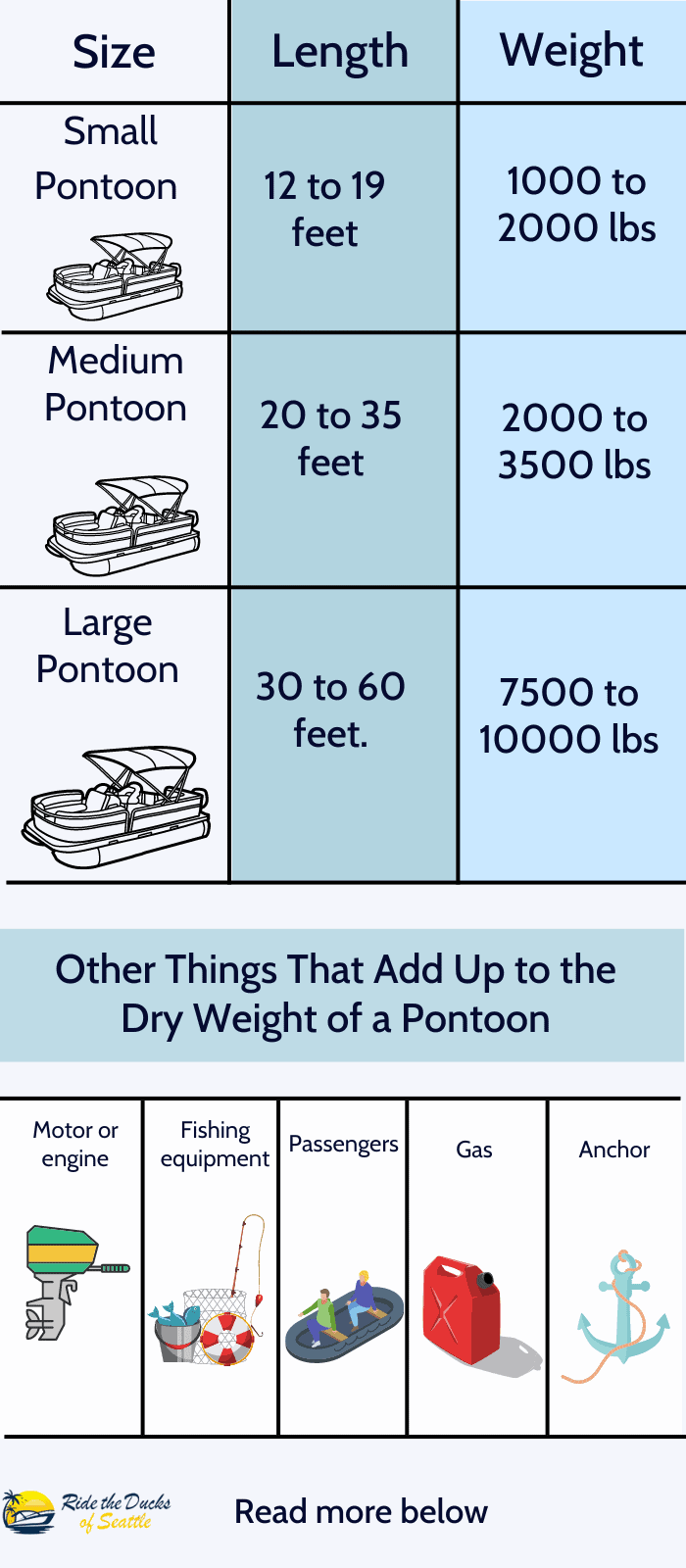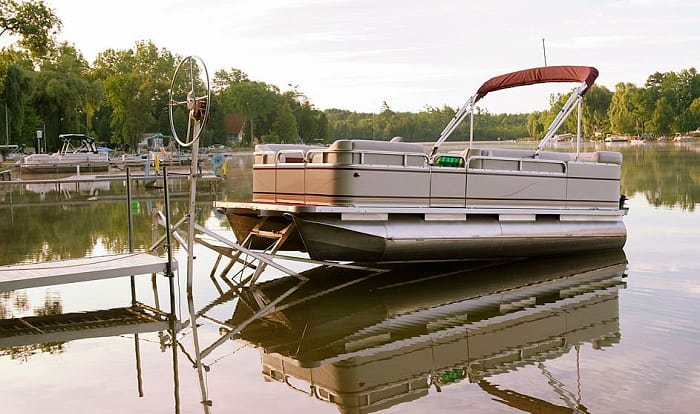Before buying a pontoon, people anticipate spending a day relaxing, fishing, or doing other fun-filled activities. It’s normal but you shouldn’t forget about being responsible and knowing important information about your pontoon. For example, how much does a pontoon boat weigh?
The average dry weight of all classes of pontoons is 2,200 lbs. This consists of an empty pontoon together with the engine and the chassis.
Its average wet weight is 4,000 lbs. and it includes the weight of fuel, passengers, equipment, and furniture.
The average pontoon boat weight is either lower or higher than other pontoons as there are various sizes. To learn further about this matter, read on.
Table of Contents
The Pontoon Boat Construction
How heavy is a pontoon boat? Before determining the weight of your pontoon, it’s best to know its construction.
The modern pontoon can have two or three aluminum pontoons. They’re linked together through screwed and welded cross members. A flat deck is placed above these pontoons and it’s usually a 3/4 –inch marine plywood.
The plywood is waterproofed when fiberglass and some materials are added. Marine carpeting is added for covering to resist molds and mildew. There’s an additional UV coating as well.
The deck is composed of aluminum rails and doors with a bimini top for shade. To run a pontoon, a large outboard motor is placed in an aluminum transom mount. If there’s only a single motor, it’s placed in the middle.
The rule of the thumb for the average weight of a pontoon boat is 100 to 120 lbs. for every foot. Thus, a 24-foot pontoon can weigh 2,400 to 2,800 lbs. as it depends on the existing amenities.
Different Pontoon Sizes and Their Weight
Pontoons come in various sizes. You can small ones that are 12-foot long and the large ones up to 60 feet long. Therefore, the sizes of pontoons are categorized as small, medium, and large.
1. Small Pontoon
A pontoon is under this category if it has a length of 12 to 19 feet. It is light so it weighs a dry weight of 1,000 lbs but the maximum weight can reach 2,000 lbs. Another example is a 16-foot pontoon that can have a dry weight of 1,400 lbs.
2. Medium Pontoon
Most people choose this type of pontoon due to its size, which ranges from 20 ft to 35 ft. A 22-ft pontoon can weigh less than 2,000 lbs. Moreover, a 20ft pontoon boat weighs almost the same.
Some prefer luxurious pontoons that are 25-ft long and weigh 3,500 lbs. You’ll be surprised that the said weight doesn’t include the motor.
The examples given may show a huge difference despite being under the medium pontoon category. This is because it depends on the materials used in constructing a pontoon and the manufacturer.
All in all, a medium pontoon will be around the weight of 2,200 to 2,500 lbs. A few pontoons weigh below 2,000 lbs.
3. Large Pontoon
Only a few people buy a large pontoon that is ideal for leisure trips. This is usually used for a guided water tour as it can accommodate more passengers with its length ranging from 30 to 60 feet.
It’s like having two 18-ft pontoons! Not many of these pontoons are produced. Since it’s the largest, it weights 7,500 lbs to 10,000 lbs.
Other Things That Add Up to the Dry Weight of a Pontoon
It’s a privilege for every pontoon boat owner to customize their vessel. However, adding an engine, furniture, and other pieces of equipment will increase your pontoon’s weight. I listed some of the necessary things here so you won’t miss adding them when using the pontoon weight calculator.
1. Motor or engine
The motor or engine on your pontoon depends on your budget, boat usage, fuel tank, and pontoon size. Depending on the model, the motor weight can be from 50 lbs. to 200 lbs. The commonly used motor weighs below a hundred pounds. Apart from the main motor, you’ll need a trolling motor when you go fishing.
A trolling motor is a must, especially in hands-free fishing. It allows you to slowly cross waterways. But there’s an additional 50 lbs to your pontoon.
2. Gas
This is a crucial substance to operate your pontoon. The usual gas tank can hold 30 gallons of gas. It’s only 6 gallons for small vessels and around 42 gallons for large ones.
Each gallon weighs 6 lbs. Thus, 30 gallons of gas will add 180 lbs. more to the pontoon’s weight, for instance.
3. Fishing equipment
Other boaters will take more than just fishing rods and tackle boxes in their pontoons. They can get a fishing chair, rod rack, and mounted grill. These things can weigh 60 lbs.
Furthermore, some people will have navigation equipment, cup holders, and waterproof bag. Every time you put more things on your pontoon, don’t forget about determining their weight.
4. Passengers
When the pontoon’s capacity is only 2,000 lbs., it’s fine to let 10 people ride as long as their total weight doesn’t exceed the limit.
5. Anchor
To make pulling an anchor convenient, you need a winch that adds up to the weight carried by your pontoon. Some boaters think of it as a boating essential but an anchor winch can be 20 lbs. more on the load.
It will also take up some space on your vessel. If you’re conscious about the space in your pontoon, you can add an anchor mount and ledge. However, these things will add to the load as well.
What Happens When You Tow Your Pontoon
Besides knowing the total weight of your pontoon, another concern that you have to focus on is the need to tow. This includes pontoon boat towing weight. The standard weight of the trailer is 1,200 lbs.
If you own the medium-sized pontoon that weighs 2,000 lbs. plus the 200 lbs. of other stuff, you’ll get 3,400 lbs. of pontoon boat and trailer weight.
Before using a truck, car, or any towing vehicle, you have to be particular with its towing capacity. You don’t want to be in big trouble when you take your pontoon with a trailer to a marina or other destination. When transporting, you must always have control of your boat.
It’s better that the towing capacity of a vehicle is higher than the combined weight of a pontoon and trailer. During the trip, you can face the strong wind and steep hills. Higher towing capacity will help you go through these things.
It’s good to have an extra 2,500 lbs. of towing capacity if the vehicle needs to carry 3,400 lbs.
Hence, a truck with a towing capacity of 5,500 lbs. is the ideal towing vehicle. Some midsize SUVs can only bear 4,000 lbs. load so it’s best for small pontoons.
Other Concerns About Pontoon’s Weight
1. Can You Distribute the Weight on a Pontoon?
It’s reasonable to think about the possibility of distributing the weight on your pontoon. You can tell if there’s uneven distribution when your boat is out of the water as one side will tilt.
When you tolerate this, one side of the pontoon wears out faster than the other. With the flat deck and tubes on a pontoon, weight distribution is not as complex as the V-shaped boat.
In a pontoon, you have to focus on front and back weight distribution. It’s advised to put more load at the back. So, the weight won’t stop your boat from moving smoothly. Passengers who walk back and forth can affect the distribution of weight.
2. The Weight to Prevent Your Pontoon From Tipping Over
There’s a low chance for a pontoon to tip over with its tubes and flat deck. It can stabilize itself in no time even if one of the tubes gets damaged. With the preceding concern, it helps to orderly arrange the things on the pontoon as well as designate passengers in certain sections.
As long as you use your pontoon on calm waters, it won’t tip over. Don’t forget that it’s not designed for rough waters and unstable water conditions. It’s a vessel that can go on lakes and rivers. No capsizing can happen if you use your pontoon sensibly.
Summary
How much does a pontoon boat weigh? The weight of your pontoon is vital information when you transport your vessel. But you also need to know the trailer’s weight so you can pick the right towing vehicle.
Don’t forget about adding things placed on your pontoon when you get the total weight. The combined weight of passengers matters as well. When you’re aware of these things, you won’t have trouble operating and transporting your pontoon.
Also, check this guide on the bass boat weight if you like!

Ten years of enjoying countless trips on boats never made me love them any less! So I am here to put all those experiences into good use for other boaters who want to have a safe and fun trip with their friends and families.




